- Home
- David R. George III
Serpents Among the Ruins
Serpents Among the Ruins Read online
“A Romulan Subcommander
Striking a Starfleet Officer,”
Harriman Said.
“My crew put in danger, possibly injured or killed.” He gestured toward the city, where the thick, dark smoke continued to rise from the sites of the two explosions. “Those are provocative actions, Admiral Vokar. At a time when your people are negotiating peace with mine—”
“We do not bargain for peace,” Vokar declared calmly. “We fight to retain our manifest right to live without constraint, and to deny the encroaching imperialism of the Federation. Imperialism, of which your presence on this planet is an example.”
“This is neutral territory, Admiral. We are visitors here, and we make no claims on this world or its people.”
“In the beginning, you are always visitors,” Vokar said. “And in the end, you always stay. But it is of no matter with respect to this planet. You are trespassers in Romulan territory, and you will leave at once.”
And there it is, Harriman thought, understanding that the months and years of diplomatic ebb and flow had ceased, and that the military tide had crashed through the levees and now threatened a devastating flood. And in risking that first move, the Romulans had also taken a strategically valuable asset.
“This is neutral territory,” Harriman said again. “The people here don’t even know that sentient life exists beyond their world.”
Vokar turned to glance up at his ship hanging above the city, the fires raging below. “They know it now.”
This book is a work of fiction. Names, characters, places and incidents are products of the author’s imagination or are used fictitiously. Any resemblance to actual events or locales or persons living or dead is entirely coincidental.
An Original Publication of POCKET BOOKS
POCKET BOOKS, a division of Simon & Schuster, Inc.
1230 Avenue of the Americas, New York, NY 10020
Copyright © 2003 by Paramount Pictures. All Rights Reserved.
STAR TREK is a Registered Trademark of Paramount Pictures.
This book is published by Pocket Books, a division of Simon & Schuster, Inc., under exclusive license from Paramount Pictures.
All rights reserved, including the right to reproduce this book or portions thereof in any form whatsoever. For information address Pocket Books, 1230 Avenue of the Americas, New York, NY 10020
ISBN: 0-7434-6404-4
POCKET and colophon are registered trademarks of Simon & Schuster, Inc.
Cover design by John Vairo Jr.
Visit us on the World Wide Web:
http://www.SimonSays.com/st
http://www.startrek.com
To Jennifer Lynn George,
who blazes through my life like a shooting star,
constantly dazzling me,
shining with her wit,
illuminating with her intellect,
and brightening with her love, kindness, and support
…I see
Moments as stones in the trails of time:
Serpentine paths cast among the cinders
Of a life weighed down by the faithful climb
To ends not my own. Loss cannot hinder
The progress gained for the promise of peace,
As stepping sidelong through the remnant ash,
I focus on the goal, my mind at ease
With the menace of war soon to be passed.
And what designs, I wonder, will I draw
As through the ruins of lifetimes I crawl?
—Phineas Tarbolde, “Sonnet XIII,”
The City After the Fire
We are but dust and shadow.
—Quintus Horatius Flaccus, “Ode VII,”
Odes, Book IV
Historian’s Note
This story is set in the year 2311, eighteen years after the presumed death of Captain James T. Kirk aboard the U.S.S. Enterprise-B in Star Trek Generations, and fifty-three years before the launch of the Enterprise-D in “Encounter at Farpoint.”
Prologue: Countdown
He heard the explosion before he saw it, and as he turned and peered down into the valley to witness walls of flame surging skyward, he knew that he’d found what he’d come here seeking. His intuitions had been realized. So too had his fears.
Captain John Harriman crouched in the tall grass, but not so low that he lost sight of the alien city spread out below the surrounding hills. The orange-red fire stood out at the edge of the municipal sprawl, the most vibrant hue among the flat whites and grays and blacks of the steel-and-concrete construction. The heavy report of the blast rolled over Harriman, drawing out agonizingly as he watched seared debris rain down on the streets and buildings bordering the inferno. The rumble, though softened by distance, contrasted dramatically with the gentle midmorning sounds that had preceded it. The lilting mesh of birdsong here in the hills had vanished now, the occasional calls and movements of other animals stilled by the artificial thunder of destruction. Even the sough of the constant breeze sifting through these undulating grasslands had been lost, overwhelmed by the deep notes now saturating the air.
Harriman reached to the back of his hip, beneath the native crimson tunic he wore so that he would blend with the inhabitants of this world; the other members of the landing party wore similar clothing. He pulled out his communicator and flipped it open. “Harriman to Enterprise,” he said, resisting the impulse to contact his first officer. The commander led the reconnaissance team currently searching the city, and Harriman wanted to know right now that the ten members of his crew composing the team had not been injured, or worse, in the explosion. But his first officer knew her job—all of his people did—and she or one of the others would contact him as circumstances allowed.
When no response came from the ship, Harriman checked the power level of the communicator. The indicator read well into the green. “Harriman to Enterprise,” he tried again. “Come in, Enterprise.” He heard urgency in his voice, but otherwise his tone remained even, belying the apprehension growing within him. He had long ago learned of the need in his position for composure; his crew looked to him for direction, and they followed the cues he provided.
Still no response.
Harriman eyed the dark billows of smoke rising into the sky, the thick plumes pushed aslant by the wind. Beneath sat the southern verge of the city, an area given over to industry. He recognized the ground-vehicle manufacturing plant as he watched that building and two adjoining warehouses burn. He could make out the shapes of people fleeing the blaze, although at this remove, several kilometers away, he could not identify any who might be Enterprise crew members. He dreaded the thought of how many casualties the Koltaari would suffer—now, and during what would surely come in the weeks and months to follow. Harriman found himself hoping, with a desperation he resented, that the conflagration below would ultimately reveal itself to be the result of an industrial accident, and not the prelude to an invasion. But he knew better.
Harriman studied his communicator, intending to execute a diagnostic on the device, but then motion to one side caught his attention. He glanced in that direction to see Lieutenant Tenger racing back toward him. The security chief’s short, well-muscled legs were hidden by the flows of tall grass, his broad torso visible above, as though sailing across the sea of green stalks. The color of his flesh nearly matched that of the lea through which he moved. His speed seemed effortless, his brawny arms barely pumping as he ran.
After the recon team had earlier detected an anomalous energy reading emanating from the hills, Tenger had accompanied Harriman out of the city in search of the reading’s source. The sensor spike had lasted only seconds and might well have been a scanning ghost or reflection, or even the produ
ct of a power surge in the tricorder itself. Considering the current circumstances, though, Harriman had been unwilling to risk ignoring anything even remotely suspicious.
Now the security chief settled on his haunches beside Harriman. “Captain,” he said, his voice resonant despite being not much louder than a whisper. “There’s some sort of interference. I can’t take any readings of the city.” He worked his tricorder, doubtless attempting to configure it in some manner that would allow him to scan successfully.
“I can’t raise the ship either,” Harriman said, holding up his communicator.
“I can’t be certain,” Tenger said, “but there appears to be a dampening field in operation.”
“A dampening field,” Harriman echoed, looking away from Tenger and back down into the valley. His gaze followed the skyline of the city, from buildings that reached up several dozen stories at its center, out to those rising just one and two stories on its outskirts. The fire had spread to another structure, he saw, and dark masses of smoke continued to coagulate above the urban wound. The roar of the explosion had faded now, replaced by the plaintive screams of sirens. The shrill wails sounded to Harriman like the keen of the city’s population, in mourning for the mutilated and dead suddenly delivered into their midst by an unseen enemy. “It’s them,” he avowed, referring to that enemy, convinced of the conclusions he had drawn from the clues he and his crew had encountered during the past days—conclusions that had led him to bring Enterprise to this world.
“Yes,” Tenger agreed.
Harriman knew that this land would offer its conquerors valuable resources—dilithium, pergium, cormaline, bilitrium—and the civilization here—technological, but prewarp—would provide the slave labor to mine and process those minerals and compounds. He also understood that those resources would be used against the Federation in the coming war. And there would be war, Harriman realized resignedly. If a world such as this could be taken—a world in disputed space, offering strategic value, with a planetbound population of two billion that posed no threat—then the delicate and increasingly tense political relations among the major spacefaring powers could collapse at any time.
Harriman thought of Amina, stationed on what would be the front lines, and then pushed away the emotions that followed. He turned back to his security chief. “What’s your assessment?” he asked.
“It’s a message,” Tenger said at once. Though hardly laconic, he tended to offer his words sparingly, saying only what needed to be said. As with many of the security officers Harriman had known during his Starfleet career, Tenger tended toward a measured and serious demeanor. “They know we’re here,” he went on. “They’ve seen Enterprise in orbit, and they’ve surely scanned the planet’s surface for our personnel.”
Harriman regarded the lieutenant. Tenger’s eyes, normally dark, distant pits, now mimicked those of the Koltaari, with large golden irises, and vertical almond shapes for pupils. His hair had also been altered, his normally short black locks now longer and lighter. Dr. Morell and her staff had similarly modified the appearance of each member of the landing party, taking the additional step of disguising their flesh; Koltaari skin color—like that of Tenger, an Orion—was pigmented a lustrous green. But all of those changes—synthetic lenses inserted into the eyes, a hairpiece set atop the head, a dye for the skin—were cosmetic, not substantive, and sensor scans would readily reveal the presence of the Enterprise crewmembers on the planet.
“It’s not just a message,” Harriman noted.
“No, sir,” Tenger said, slowly shaking his head from side to side. “It’s a challenge.”
“Yes,” Harriman said. “It’s also a warning. And a threat.” But could they beat back that threat? It remained unclear whether or not the Klingon Empire would fight beside the Federation if war erupted. Despite nearly eighteen years of peace between the two powers—Or maybe because of it, Harriman thought—the allegiance of the Klingons could only be characterized as uncertain. If forced to stand alone, the Federation would face a daunting future, where even eventual victory, if it came, would cost incomprehensible losses.
Harriman stood to his full height, and Tenger followed suit beside him. Although almost a head shorter, the burly security chief probably outweighed him by twenty kilos. “Let’s go meet that threat,” Harriman said with a confidence he did not completely feel, but that he felt it important to project. He placed his communicator back beneath his tunic, and Tenger stowed his tricorder in a leather satchel he carried on a shoulder strap. Harriman led the way through the tall grass to a travel-worn dirt path, and the two men began down the hill.
They had reached the paved road that would lead them into the Koltaari capital when the second explosion rocked the city.
Demora Sulu ran. Panic flowed around her like a river, the inhabitants of the city streaming past, the collective din of footfalls, screams, and sirens bounding along the building façades like water rushing along stony banks. And like the impending menace of a waterfall around a bend up ahead, the fire—the second fire—roared without pause somewhere in the distance.
She struggled through the tide of Koltaari, racing in the opposite direction of the fleeing throng. Shoulders, arms, legs, and feet struck her as people dashed by. She changed direction for a moment and fought her way across the living current to the side of the street. Then, using the buildings to protect her on one side, she hurried on.
No lights shined within the broad windows of the store-fronts she passed, and she guessed that the second bombing had damaged or destroyed the city’s power plant. She and Lieutenant Trent had left that site not an hour ago—and just last night, members of the landing party had visited the manufacturing part of the city, where she believed the first explosion had occurred. Sulu might have considered the timing fortuitous had she not immediately dismissed the notion that events had been coincidental. No, she and Trent and the others hadn’t been lucky; they’d been permitted to leave those sites before the attacks. Although she hadn’t been able to contact anybody using her communicator, she felt sure that the rest of the landing party had escaped injury in the blasts. As heinous as killing innocent and essentially defenseless Koltaari was, the act did not carry with it the political implications of an assault on Starfleet personnel or Federation citizens.
The dry taste of ash filled Sulu’s mouth as she raced in the direction of the fire. The air grew warmer as she ran, the autumnal cool of the morning bleeding away, as though the calendar were somehow slipping ahead to the high heat of a summer afternoon. The crowd thinned as she continued forward, and she hoped that she would not arrive too late to help bring others to safety.
The ambient light wavered, shadows fluttering across the scene. She peered up past the buildings lining the street to see inky trails of smoke intermittently obscuring the Koltaari sun. Flakes of soot floated down from the sky like blackened snow. Even without being able to see the fire itself, Sulu was beset by a sense of disaster.
How could they do this? she asked herself in frustration. The Koltaari had not done anything—lacked the capability of doing anything—to warrant these attacks. Their society had matured to the point of uniting beneath a single government, but they had taken only the smallest steps out into their solar system, and they knew nothing of life beyond their own world. Their planet, though long valued by the various powers of the Alpha and Beta Quadrants for its abundant and untapped natural resources, had benefited from its position beyond established political boundaries. Its strategic location had actually protected the Koltaari, for any incursion onto their world by one power could easily be interpreted by the others as an act of aggression. For decades, that threat of interstellar conflict had kept the Koltaari safe.
Until now, Sulu thought bitterly.
She pressed on, the flood of Koltaari running past her now reduced to a trickle. She reached an intersection and turned onto the road leading directly to the power plant, expecting to see the structure in flames just a few hundred meters aw
ay. Instead, the fire only peeked out here and there from beyond a veil of dense gray smoke. But even hidden, the blaze roared, its gusty voice punctuated by hissing and cracking and the sporadic clamor of ruin: what sounded like a ceiling timber crashing down, a wall toppling, the metal of machinery moaning as the fierce heat robbed it of its strength.
A Koltaari man suddenly lurched out of the chaos, teetering as he limped forward. He coughed violently, and Sulu saw that his green flesh had discolored around his nose and mouth, the black smudges there obviously noxious trails the smoke had left. His eyes were tightly shut, his arms held out before him like those of a blind man navigating an unfamiliar environment.
Sulu sprinted forward, ducked down, and threw a shoulder beneath the man’s arm. “I’ll help you out of here,” she said, and only after the words had left her mouth did she realize that she had yelled them. Along with the noise of the fire, the sirens had grown louder now, and she could visualize the Koltaari firefighters heading for the blaze, the chain of bright blue, ovoid hovercraft impeded by the people clogging the streets.
For a moment, Sulu feared that the man had not heard her above the tumult, but then he leaned heavily on her, allowing her to guide him. She walked him quickly away, back the way she had come. Once around the corner, she settled the man against the brick wall of a building. He slumped, his eyes still closed. She reached up and took his face between her hands, experiencing an odd instant of disconnection at the sight of her own skin colored green.
The man’s eyes opened, but he didn’t seem to see her. His pupils had contracted into narrow slits, and Sulu wondered if shock would prevent him from being able to get himself away from here. “You have to keep moving,” she shouted. The man blinked twice, and then his gaze found her. He nodded his head in apparent understanding. “I have to go back,” she told him, dropping her hands from his face. “You need to keep moving.” The man nodded again, then pushed off of the wall and started away. She watched him for only a few seconds before turning and heading back toward the inferno.

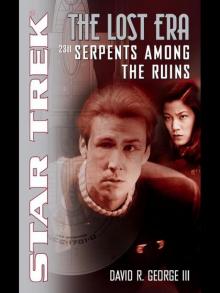 Serpents Among the Ruins
Serpents Among the Ruins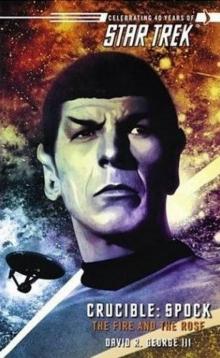 The Fire and the Rose
The Fire and the Rose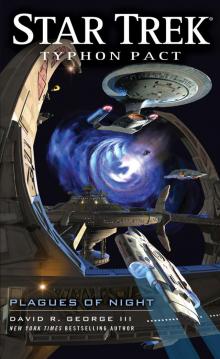 Star Trek: Typhon Pact 06: Plagues of Night
Star Trek: Typhon Pact 06: Plagues of Night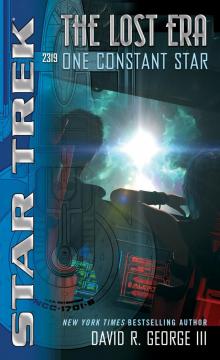 Star Trek: The Lost Era - 08 - 2319 - One Constant Star
Star Trek: The Lost Era - 08 - 2319 - One Constant Star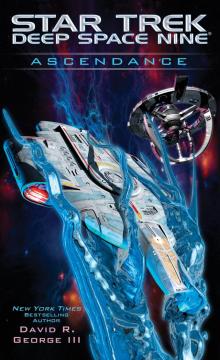 Star Trek: Deep Space Nine: Ascendance
Star Trek: Deep Space Nine: Ascendance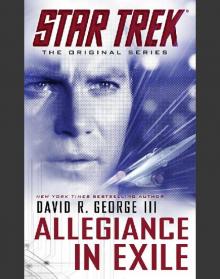 Star Trek: TOS: Allegiance in Exile
Star Trek: TOS: Allegiance in Exile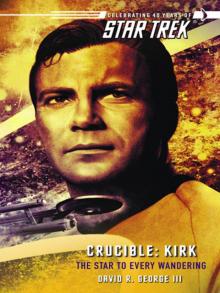 Crucible: Kirk
Crucible: Kirk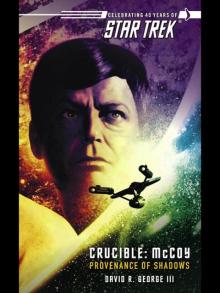 Crucible: McCoy
Crucible: McCoy The Long Mirage
The Long Mirage Original Sin
Original Sin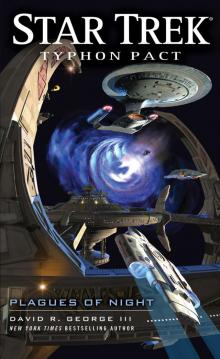 Star Trek: Typhon Pact: Plagues of Night
Star Trek: Typhon Pact: Plagues of Night Allegiance in Exile
Allegiance in Exile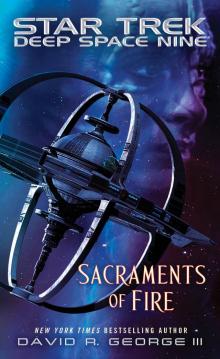 Sacraments of Fire
Sacraments of Fire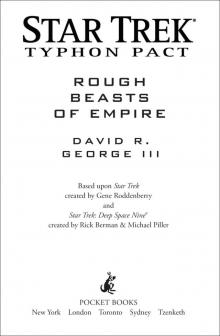 Star Trek: Typhon Pact: Rough Beasts of Empire
Star Trek: Typhon Pact: Rough Beasts of Empire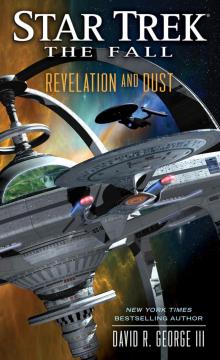 Star Trek: The Fall: Revelation and Dust
Star Trek: The Fall: Revelation and Dust